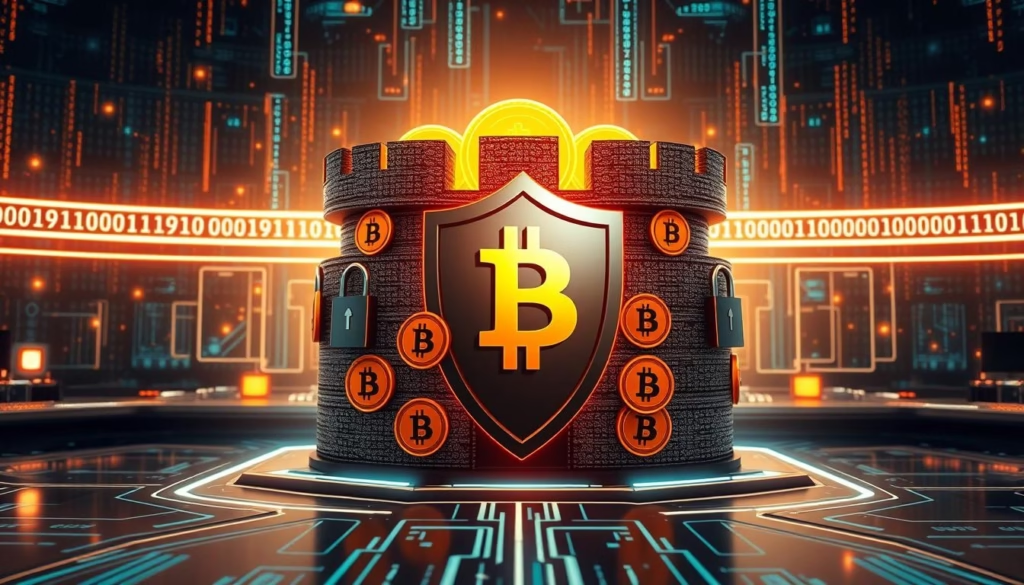Best Practices for Bitcoin Transactions
Secure bitcoin transactions are key to protecting your investments. Always verify transactions by checking the transaction ID and confirming the recipient’s address14. Also, consider the fees, as high fees can increase the cost of transactions15.
Secure storage is vital for bitcoin security. Hardware wallets, like Ledger and Trezor, store private keys offline and are very secure15. Keep your cryptocurrency safe by using a personal wallet instead of exchanges, which can be hacked or ban accounts15.
To boost bitcoin security, use two-factor authentication (2FA) and keep your software updated15. Also, use strong passwords and avoid public Wi-Fi when accessing your wallet15. These steps help ensure your transactions are secure and your investments are protected.
- Hardware wallets, such as Ledger and Trezor
- Software wallets, such as Electrum and MyEtherWallet
- Cold storage solutions, such as paper wallets and offline storage devices
By picking the right storage method and following best practices, you can safeguard your investments and keep your bitcoin safe14.
Top-Rated Bitcoin Exchanges for U.S. Residents
When buying or selling bitcoin, choosing a reputable exchange is crucial for security and ease of use.
Popular exchanges for U.S. residents include:
Coinbase: Known for user-friendly interfaces and robust security measures.
Kraken: Offers advanced security features and low transaction fees.
Gemini: Provides high security, including cold storage for customer funds.
Before selecting an exchange, review its fee structure, available cryptocurrencies, and security policies to ensure it meets your needs
Advanced Security Protocols for Bitcoin Storage
Exploring bitcoin wallet security is key. We must grasp the need for safe storage methods. Data shows16 that 17 to 23 percent of all bitcoin are lost due to bad key management. This shows the importance of strong security measures.
Advanced security steps can help. These include multi-factor authentication, backup plans, and recovery options. For example, using a hardware wallet like Ledger or Trezor17 adds extra security. Vault services18 also offer better security with multi-signature and waiting periods.
Here are some top tips for storing crypto:
- Back up keys and use strong authentication
- Avoid phishing attacks and keep software updated
- Consider diversifying storage methods, including cold storage solutions17
- Use multi-signature wallets for added security18
By using these advanced security steps and following best practices, users can greatly improve their bitcoin wallet security. This helps protect their assets from threats161718.

Protecting Your Bitcoin from Hackers
To safeguard your bitcoin, proactive steps are key:
Use Two-Factor Authentication (2FA): Add an extra layer of security to your wallet and exchange accounts.
Secure Private Keys: Never store your private keys online. Consider using encrypted backups.
Monitor Account Activity: Set up alerts for unusual login attempts or withdrawals.
Avoid Public Wi-Fi: Use a virtual private network (VPN) for added security when accessing your wallet.
By staying vigilant and following these tips, you can minimize your risk and keep your bitcoin safe from cyber threats.
Safest Way to Store Bitcoin Long Term
For long-term bitcoin security, a robust storage strategy is critical. Cold storage, such as hardware wallets and paper wallets, offers unmatched safety. Unlike hot wallets, cold storage solutions are offline, shielding private keys from online threats.
When selecting a hardware wallet, research models like Ledger Nano X and Trezor Model T. They feature advanced security protocols and recovery options. Always back up your recovery seed phrase and store it separately from your wallet.
Diversifying storage methods and conducting regular security audits further protect your holdings. By implementing these strategies, you enhance your bitcoin security for the future.
Protecting Your Bitcoin from Cyber Threats
When we talk about bitcoin security, cyber threats are a big concern. Keeping your bitcoin safe from these threats is key. Recent data shows that cybercriminals use botnets to mine cryptocurrency, causing big problems like slow performance and extra risks like DDoS or ransomware19.
To keep your bitcoin safe, you need to know about different threats. These include phishing attacks, cryptojacking, and other harmful activities. Using secure exchanges, setting up account alerts, and being careful of phishing can help protect your digital assets19.
Also, using hardware wallets like Ledger Nano S/X and Trezor can help keep your private keys safe from hackers19. Setting up strict access controls and watching for insider threats can also help with bitcoin storage security. By doing these things, you can keep your bitcoin safe from cyber threats.
Knowing about cryptocurrency scams is also important to keep your investments safe. Scams like phishing attacks, social engineering, insider threats, and investment scams can harm your digital assets19. By staying informed and taking the right steps, you can protect your bitcoin and keep it safe from cyber threats.

Related Article



